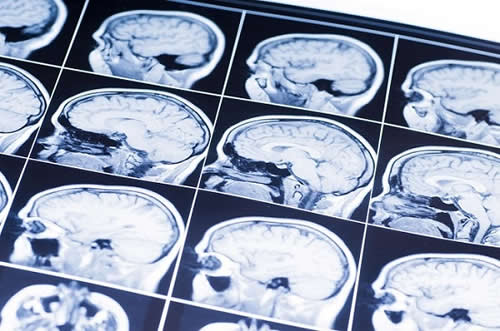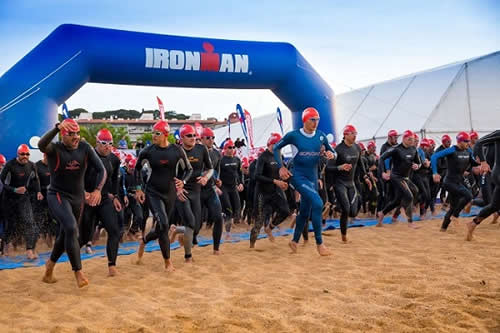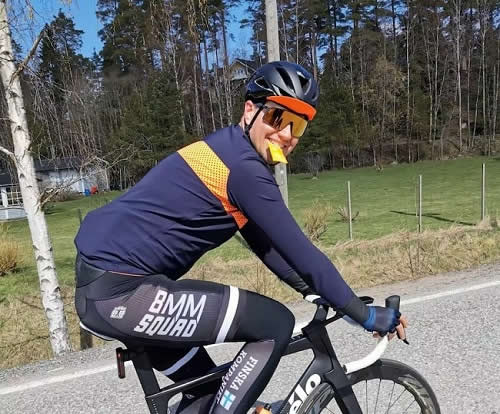Positive Health Online
Your Country

Traumatic Brain Injury Overcome by Ironman Robson Lindberg
listed in exercise and fitness, originally published in issue 284 - February 2023
Many people take the power of the brain for granted. We live our daily lives on autopilot without realizing the importance of brain function for the smallest things, like talking or drawing. However, there comes a time when some people, like Triathlete Robson Lindberg, are faced with a major life changing accident, after which their everyday life takes a 360 degree turn.
Triathlete Robson Lindberg
Robson Lindberg, IRONMAN presenter, triathlete (an IRONMAN himself) and inspirational speaker shares his incredible story about defying the odds after a brain injury, with Susie Perry Dip ION Food Scientist and Nutritional Therapist as part of the Vitamin C Convention 2022 series.

Robson Lindberg sustained a brain injury in 2015 while playing ice hockey.
Robson says that sports have been his lifelong passion- starting his first when he was one and a half years old. Unfortunately, back in 2015 he had a brain injury while playing ice hockey. From that point on, he had to relearn everything, from crawling to walking, to writing – the list goes on.
The brain damage had some important impact on his personality as well. Before the accident, he described himself as being very extrovert, but he came to realize, during some family holidays following the incident, that he had gone to the opposite side of the spectrum, being extremely introverted. Such changes are not uncommon: a study that investigated personality traits after brain injury found that 59.1% of people experienced changes in their personality following acquired severe brain injury.[1]
“20 neurologists sat in their chairs with their white coats on, and told
me I'm never doing any sports and I'm never going to work again.”
After Robson´s amazing recovery, he reflected on the response of medical personnel, which made him realize:
"...there is a stigma around western medicine because it is deeply rooted in science and knowledge… if I was treated not as a statistical outlier but as a valid data point we wouldn't be having this discussion, unfortunately, recovery is mostly ascribed to personality traits or resilience.”
Robson was afraid of all the changes going on, but there was one thing that did not change throughout this traumatic experience: his passion for sports, which motivated him to get better:
“ …It was the scariest thing I've done in my life, I admitted to myself that I got brain damaged and I need a goal, and that goal was the first thing I thought of: I want to win the first championship of IRONMAN cup in Hawaii”.
What is an Ironman?

Ironman Triathlon
An Ironman Triathlon is considered one of the hardest sport competitions in the world. It is a long distance triathlon consisting of 3 different sports:
- Swim 2.4 mile (3.8 km)
- Bike 112 mile (180.2 km)
- Run 26.2 mile (42.2 km)
Training for the IRONMAN consists of five pillars: Balance of your own strengths and weaknesses at all three sports; Consistency of training while juggling daily life and busy schedules; Endurance because sustaining is necessary for succeeding; Adaptability for adjusting goals to your own body and needs and lastly Recovery, which plays an essential role in the training spectrum. Find your next IRONMAN race here!
Everesting: All You Should Know
Robson is an excellent athlete and enjoys quite an interesting sport called Everesting. It consists of either running, cycling or ski touring up and down the same hill until you have reached 8,849 metres – the same height as the summit of Mount Everest.
His training usually involves both low intensity and high intensity periods just around the aerobic threshold, building up endurance. He started with one long 3 hours ride a week, and now he endures a 7 hours a week ride, on average.

This is a map of a tour he did in less than 24 hours in Finland:
628km around Helsinki, Turku, Tampere and then Helsinki again.
Tweaks for the Marathon
Robson shares with us his daily life tweaks for a maximized sports performance. He mentions that small changes turn out as big results, for example, changing his waking time, sleeping time, eating habits and drinking green tea. From time to time he follows a low carb, high fat diet and feels his energy levels rising rapidly. He has also used a keto diet to lose over 10 kilos in 2 months. But the most important tweak for him would be including Liposomal Vitamin C every day in the morning or evening. Also, if he feels a flu coming up, he takes up to 3 sachets of Altrient C in the morning to help prevent it.
Vitamin C – the Star Product for Athletes
Vitamin C has lots of benefits that have been linked to a better performance:
- Helps reduce tiredness and fatigue;
- Helps in supporting energy yielding metabolism;
- Supports normal functioning of the nervous system;
- Supports normal psychological function (mood and mindset);
- Helps muscles recover after physical exercise;
- Enhances immune support.
It's no wonder vitamin C is a favourite amongst athletes, including triathletes and Olympians such as Jessica Ennis Hill. Altrient C has also passed Informed Sports doping tests so it can be taken by professionals with confidence. More info here.
What Happens to our Body when we Exercise?
“What high intensity training does is that it exposes you and lowers your immune system, making you more susceptible to colds, etc..”
Even if high intensity exercise is great for our health, as we are stepping up and using our muscles and lungs, the antioxidants quickly try to protect the body and take care of all those free radicals that are released at this time. However, mopping free radicals can often leave other areas of the body, like the immune system, less assisted and with a decreased number of nutrients to support it. Intense exercising is a stressful activity for the body. This is why it is common for endurance athletes to have a tendency for upper respiratory tract infections.
Vitamin C and Mental Health
Turns out Liposomal vitamin C also plays a big role in athletes´ lives by having an impact on their minds. As Robson describes it, sportspeople like to optimize and calculate, and also set clear goals to accomplish while training. Therefore, the more mental acuity you have, the better for accomplishing goals, optimizing and accomplishing calculations and “vitamin C is definitely a part of that” according to Robson.
Vitamin C is way more than just about immune support and muscle recovery; what it can do for the mind is amazing: “I soon noticed after taking it, 20 minutes later, a bit of an uplift and a bit more mental clarity...” -Susie.
Robson Lindberg continues showing his passion for sports, is now a dad, an inspirational speaker and keeps on being the best TBI (traumatic brain injury) patient. Follow Robson on: @stupid7cycling and @robson.lindberg.
Watch the whole video and more from the series here!
https://www.youtube.com/watch?v=O4xFrlMcUXI
References
- Norup, Anne & Mortensen, Erik. Prevalence and Predictors of Personality Change After Severe Brain Injury. Archives of Physical Medicine and Rehabilitation. 10.1016/j.apmr.2014.08.009. 2014.
Acknowledgement Citation
Originally published on: abundanceandhealth.co.uk
Comments:
-
No Article Comments available
